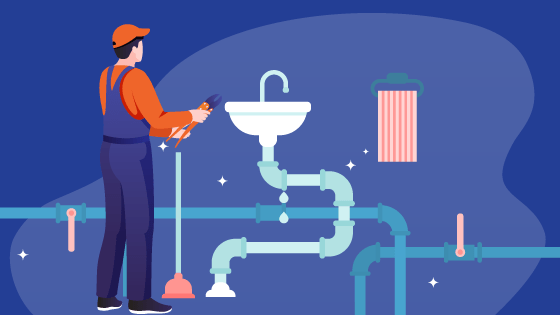
18 Mar 5 Habits That Actually Harm Your Plumbing
Everyone has some bad habits they would like to ditch. Kicking a bad habit can be pretty hard. Sometimes it takes up a wake-up call to truly stop your crummy habit. Now, what if we told you that some of your habits are causing damage to your plumbing? With these habits, it’s best to stop them pronto to save your pipes and your budget.
-
Letting Your Hair Go Down The Drain
If you have long hair, then you know you lose a lot of hair in the shower. Your shower drain becomes bombarded with all this extra hair. If you don’t have long hair maybe your shave your face over the sink. The same thing applies, your sink drain takes in all that hair. While you might not think about that excess hair going down the drain, it’s really building up a huge problem. Hair can cling to soap scum or other materials residing in the pipes. This can cause clogs that ultimately will damage your pipes even further. However, fixing this habit is pretty simple. Instead of letting your hair freely go down the drain, buy a mesh drain screen. You can place these right over a shower or sink drain. Boom, problem solved!
-
Overusing Your Garbage Disposal
Doing the dishes might be up there on the worst chore list. We get it, there are thousands of things you rather would be doing than scrubbing your dinner off plates. It’s perfectly understandable that you speed up the process but dumping everything down the drain and letting the garbage disposal handle it. However, your garbage disposal can only handle so much. If this a common habit you do, your garbage disposal might be overworked. If you throw things like eggshells, potato peels, bones, fruit pits, or non-food items you’re damaging your garbage disposal and the connecting pipes. When it comes to these food items, they should be tossed in the trash rather than your drain. Give your garbage disposal a well-deserved break.
-
Too Much Chemical Drain Cleaner
Do you have a pesky drain that empties the sink too slow? Every time you wash your hands it takes forever for all the water to disappear. For most people, when this happens they dump a chemical drain cleaner down the sink. They walk away, patting themselves on the back for a job well done. Unfortunately, drain cleaners can cause some significant damage to your pipes. While they might be effective at clearing up small clogs, the chemicals actually can wear away your pipes. Additionally, if you have a septic tank, these chemicals can destroy the waste-eating bacteria living in your tank. If this happens, your sewage tank could backup. When you encounter a slow drain, avoid the chemicals and use a pipe-clearing tool or call a plumber to remove the real nasty clogs.
-
Your Toliet Isn’t A Trash Can
It can be easy to toss waste into your toilet. Just flush the trash and never think about it again. Similar to garbage disposals, this isn’t a great habit to have. If you’re flushing feminine hygiene products, paper towels, cotton swabs, or wipes you’re risking the chance of a serious clog. Toilet paper is designed to dissolve in water these products are not, even if they are deemed flushable. You’re best bet is to throw these products in the trash and save yourself from the trauma of a clogged toilet.
-
Ignoring Minor Leaks
Leaks can happen all the time. If it’s a small tiny leak, it’s easy to not see that as a huge issue. After all, it’s just a few water drops how bad could it really be? The truth is, this could be the first warning signs of a much larger problem. The constant drip, drip drip from your sink can increase your water bills and cause pipe damage. Ignoring this problem altogether could lead to your pipes even bursting. The longer you let that leak linger the worse the problem will be and that increases the cost of fixing it. It’s smart to get that leak fixed quickly. Scheduling simple plumbing maintenance should do the trip and get that annoying drip to stop.
Conclusion
Bad habits are hard to kick to the curb. Once you’ve recognized your habits you’re already on the path to shutting them down for good. Push these habits behind you and start taking care of your plumbing today.

